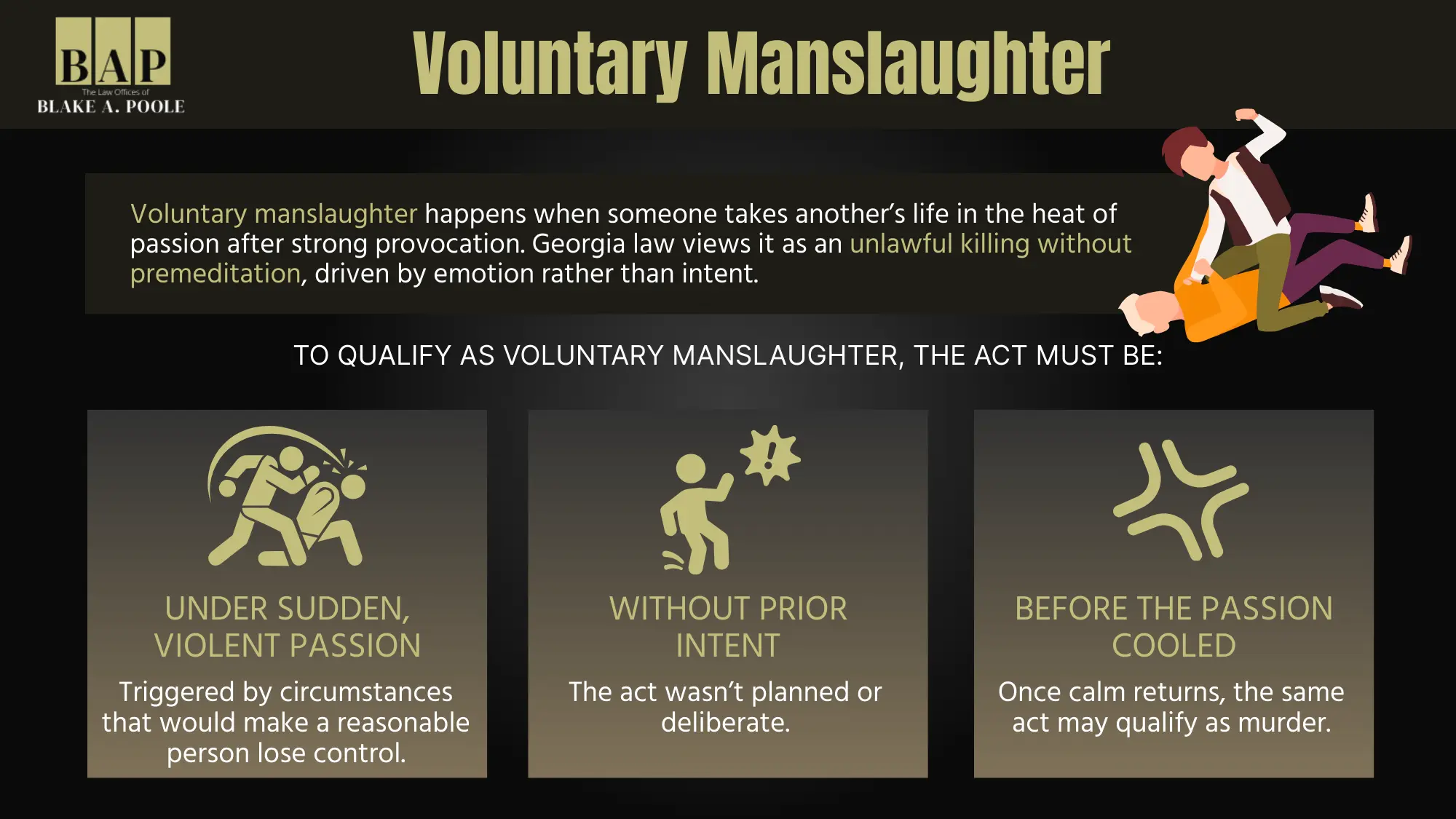November 24, 2025
By Blake A.Pool
Free Consultations
|
24/7 for Emergency Help

November 26, 2025
By Blake A. Poole
When someone loses their life because of another person’s actions, the law takes a hard look at intent, behavior, and the circumstances surrounding the death. Not all unlawful killings are treated the same way. In Georgia, the distinction between voluntary and involuntary manslaughter can determine whether the accused spends years or even decades behind bars.
Let’s break down these two categories of manslaughter, what they mean, and how a manslaughter defense lawyer can help your case.
Manslaughter is the unlawful killing of a human being without the malice aforethought that characterizes murder. In other words, the defendant didn’t act with malicious intent or a deliberate plan to kill, but their actions still resulted in someone’s death. Georgia law recognizes two main types of manslaughter: voluntary and involuntary.

Voluntary manslaughter happens when someone kills another person in the heat of passion. The law recognizes that under extreme emotional stress and with adequate provocation — when a reasonable person might lose self-control — a killing can occur without prior intent or malice.
For example, imagine that you catch your spouse in an affair and become enraged. That momentary lapse of self-control could lead to a killing that’s unpremeditated but nonetheless unlawful.
In Georgia, voluntary manslaughter is defined under O.C.G.A. § 16-5-2.
To qualify as voluntary, the defendant must have acted:
Common situations that lead to voluntary manslaughter include:
Voluntary manslaughter is considered a felony and is punishable by up to 20 years in prison.

Involuntary manslaughter occurs when a person unintentionally causes someone else’s death while committing an unlawful act (not amounting to a felony) or a lawful act performed in an unlawful manner. In simpler terms, this type of manslaughter doesn’t involve intent to kill but instead stems from reckless behavior or criminal negligence.
O.C.G.A. § 16-5-3 defines the two types of involuntary manslaughter:
This crime reflects a disregard for human life, even though there was no specific intent to kill.
Penalties vary depending on the severity and nature of the act. In Georgia, involuntary manslaughter can carry a sentence of one to 10 years in prison if it occurs during an unlawful act or up to 12 months in jail if the act was lawful but done carelessly.
#cta_start
Your case deserves personalized attention and skilled representation. Contact The Law Offices of Blake A. Poole today to schedule your free consultation and start building your defense.
#cta_end
The difference between voluntary and involuntary manslaughter comes down to intent and emotional state. Here’s a closer look:
While both crimes involve taking the life of another person, voluntary manslaughter is marked by a loss of self-control, whereas involuntary manslaughter stems from carelessness or disregard for safety.
When deciding between charges of voluntary and involuntary manslaughter, prosecutors look at:
These details can significantly affect the charges — and ultimately, the penalties — a suspect faces.

Every case is different, but criminal defense attorneys often rely on a few proven strategies to fight manslaughter charges in Georgia:
The best defense depends on the facts of the case, but having an experienced criminal defense attorney develop and present sound legal arguments can make all the difference.
If you’re facing voluntary or involuntary manslaughter charges, your freedom and future are on the line. Georgia's manslaughter laws are complex, and the difference between a lesser offense and a felony punishable by decades in prison often hinges on small details — a few seconds of emotion, or a single careless act.
A skilled criminal defense lawyer will know how to identify weaknesses in the prosecution’s case, gather compelling evidence, and highlight mitigating factors that could get your charges dismissed or reduced.
At The Law Offices of Blake A. Poole, we understand the emotional and legal weight of these cases. Our team will examine every relevant detail to build a robust defense and protect your rights under Georgia law. Contact us today for a free consultation.
Every detail counts when you’re accused of an unlawful killing. Trust our experienced Georgia criminal defense attorneys to help you fight for your freedom.
Your case deserves personalized attention and skilled representation. Contact The Law Offices of Blake A. Poole today to schedule your free consultation and start building your defense.
Lorem ipsum dolor sit amet, consectetur adipiscing elit. Suspendisse varius enim in eros elementum tristique. Duis cursus, mi quis viverra ornare, eros dolor interdum nulla, ut commodo diam libero vitae erat. Aenean faucibus nibh et justo cursus id rutrum lorem imperdiet. Nunc ut sem vitae risus tristique posuere.
We begin working immediately to preserve evidence, interview witnesses, and file necessary motions. Early intervention often prevents charges from being filed or reduces their severity.
You have only 30 days to challenge your license suspension. Every day you wait makes it harder to build a strong defense. Call now!
Block Quote